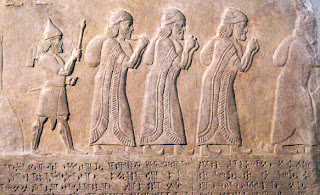Book of Eldad
Written in the late 9th century, The Sefer Eldad [Book of Eldad], authored by the Arabian Jewish author Eldad ha-Dani [the Danite], is a sometimes imaginative account of Eldad's travels through Egypt, Mesopotamia, North Africa, and Spain. It is a text that the author of the Prester John Letter appears to be familiar with, which tells us something of this author's learning, since the Sefer Eldad was not translated into Latin until the sixteenth century.
The Letter's allusions to the Ten Lost Tribes and the River Sambatyon (dry, sandy sea), along with the early translations of the Letter into Hebrew, link the Prester John Letter with the tradition of the Sefer Eldad.
The Letter's allusions to the Ten Lost Tribes and the River Sambatyon (dry, sandy sea), along with the early translations of the Letter into Hebrew, link the Prester John Letter with the tradition of the Sefer Eldad.
Hamilton summarizes this tradition in his article "Prester John and the Three Kings of Cologne":
“In the late ninth century a certain Eldad ha-Dani, claiming to belong to the lost tribe of Dan, visited by the Jews of Kairouan and gave them news of their compatriots. They were, he said, settled in various parts of Asia, some in independent states, but the Levites were cut off from the rest by the river Sambayton, which was unnavigable, being composed not of water, but of sand and stones. In obedience to the Torah it ceased to flow on the Sabbath day, but that was no help to Jews who wished to cross it since they were similarly immobilised by the precepts of the law. In this way the Ten Lost Tribes were added to the list of the marvels of Asia” (172).
Ten Lost Tribes: Babylonian Exile

Beckingham and Hamilton summarize the relationship between Prester John and the Sefer Eldad tradition in the "Editors Preface" of their edition of the Hebrew Letters of Prester John.
“Among the inhabitants of Prester John’s Empire were the Ten Lost Tribes of Israel, who lived beyond the stony river Sambatyon which does not flow on the sabbath. The Jews were naturally interested in his story, and versions of the Letter of Prester John were circulated in Hebrew probably from the late twelfth or early thirteenth centuries. These have been edited with an English translation by Edward Ullendorff and C.F. Beckingham, The Hebrew Letters of Prester John, Oxford, 1982. In their introduction the authors considered the relation of the Prester John Letter to the narrative of Eldad ha-Dani, a Jew who visited Qayrawan in 883, claiming to be a member of one of the Ten Lost Tribes. The narrative of his discourse, the Sefer Eldad, was available only in Hebrew in the Middle Ages, and is almost 300 years older than the earliest extant version of the Prester John Letter, yet it contains material common to them both but found in no other source” (xiii).
More on the Sefer Eldad tradition.